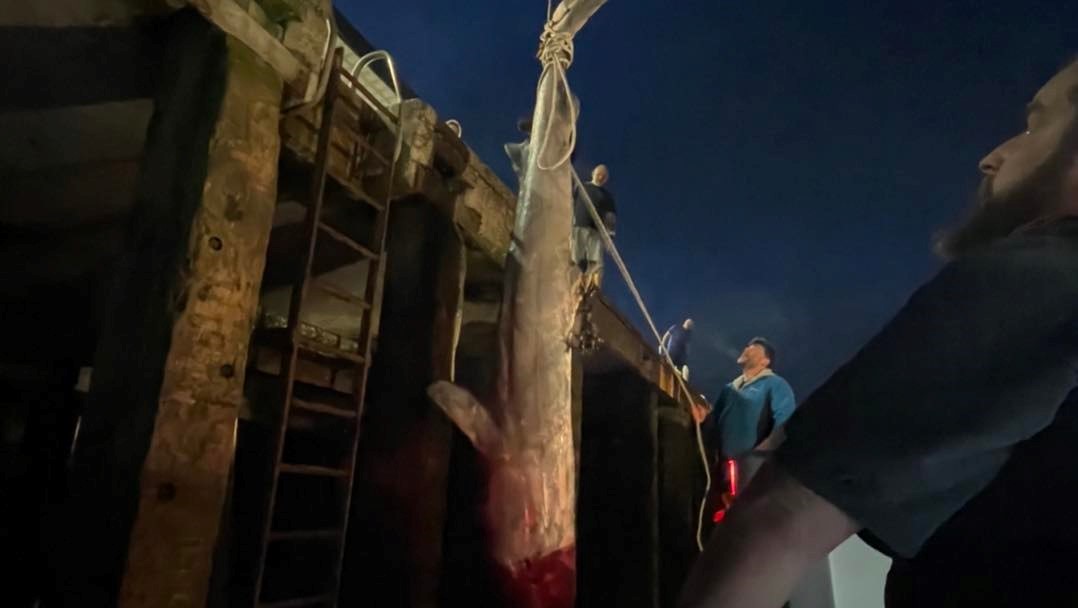Super-rare Greenland shark that washed up on UK beach may be at least 100 years old
Greenland sharks typically live in the deep ocean.

A rare Greenland shark that washed up on a U.K. beach could be at least 100 years old, but experts aren't sure why it became stranded.
The dead shark was first spotted on the sand in Newlyn Harbour, Cornwall, on the southwest coast of England, on March 13. But before experts could examine it, the tide came in and took the carcass back out to sea, according to Cornwall Wildlife Trust Twitter posts.
The shark was then rediscovered floating off the coast of Cornwall on March 15 by a recreational boating company called Mermaid Pleasure Trips and was brought back to shore. Greenland sharks are rarely sighted in the U.K., and this is the country's second recorded Greenland shark stranding.
"Even though it's a sad event when these beautiful, spectacular animals do strand on our beaches, it's such a valuable opportunity for us to study them," Abby Crosby, a marine conservation officer who manages the marine strandings network at the Cornwall Wildlife Trust, told Live Science.
Related: The weirdest creatures to wash ashore
Greenland sharks (Somniosus microcephalus) live in the Arctic and North Atlantic oceans up to 8,684 feet (2,647 meters) below the surface, according to the International Union for Conservation of Nature (IUCN). A 2016 study published in the journal Science estimated that these sharks could live at least 272 years, but scientists still have much to learn about the elusive species.
The shark that washed up in Cornwall was a juvenile female that measured 13 feet (4 m) long and weighed 628 pounds (285 kilograms). Although researchers have yet to determine the shark's age, Greenland sharks typically become sexually mature when they're around 150 years old, according to the 2016 study. The animals continue to grow as they age, and adults can be up to 24 feet (7.3 m) long, according to the St. Lawrence Shark Observatory (ORS).
Get the world’s most fascinating discoveries delivered straight to your inbox.
James Barnett, a veterinary pathologist from the Cornwall Marine Pathology Team, carried out a postmortem of the shark on March 16 for the Cetacean Strandings Investigation Programme (CSIP), a national program that partners with Cornwall Wildlife Trust's Marine Strandings Network.

"It looked like it probably live-stranded," Barnett told Live Science. In other words, the shark was still alive when it washed up, and it died on the beach. "It obviously hadn't eaten for some time," Barnett said. "The stomach was totally empty."
Barnett noted that the shark showed possible signs of septicemia, an infection in the blood, but it's not yet clear why the shark wasn't eating and ended up in shallow waters off Cornwall. There are a variety of reasons, including disease, that can explain why marine animals become stranded and die on beaches, but the movement of ocean currents and other marine conditions also play a part in bringing living and dead animals to shore.
"The majority of our strandings are common dolphins and porpoises, and they would have all died within a kilometer [0.6 mile] of our coastline, if that," Crosby said. Because Greenland sharks usually swim far from the coast, the likelihood of one being swept in by the right current and weather conditions is really rare, she added.
Barnett said this is the first time a Greenland shark has been given a necropsy in the U.K., to his knowledge. "They are a species that we just don't encounter," he said. Samples taken from the shark will help inform Greenland shark research, such as studies investigating their life history and diet, Rob Deaville, project manager for CSIP at the Zoological Society of London, said in a statement.
Originally published on Live Science.

Patrick Pester is the trending news writer at Live Science. His work has appeared on other science websites, such as BBC Science Focus and Scientific American. Patrick retrained as a journalist after spending his early career working in zoos and wildlife conservation. He was awarded the Master's Excellence Scholarship to study at Cardiff University where he completed a master's degree in international journalism. He also has a second master's degree in biodiversity, evolution and conservation in action from Middlesex University London. When he isn't writing news, Patrick investigates the sale of human remains.
